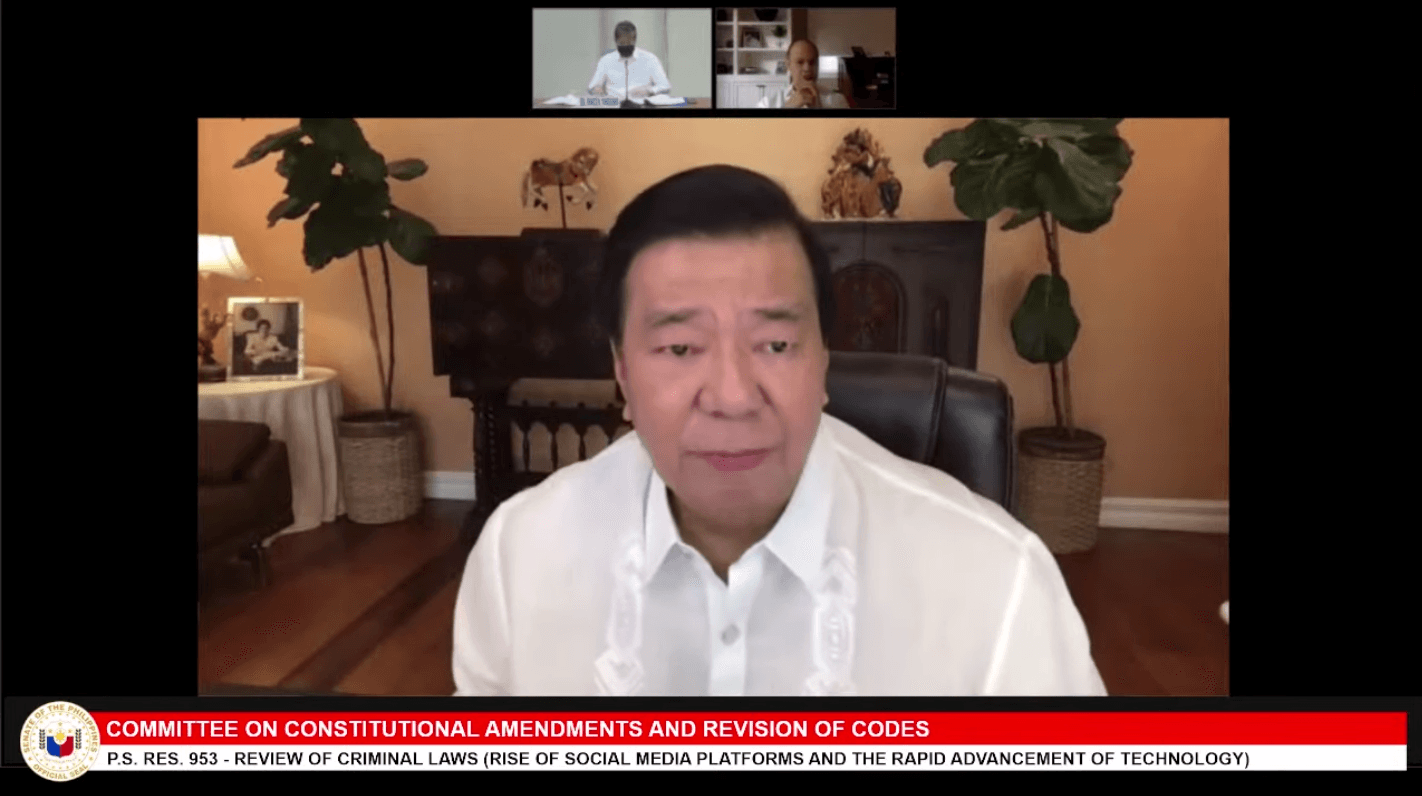SUMMARY
This is AI generated summarization, which may have errors. For context, always refer to the full article.

MANILA, Philippines – Senate Minority Leader Franklin Drilon sought guidance on a proposed law that would compel social media platforms to reveal the identity of supposed “trolls,” or anonymous accounts online.
During a Senate committee on constitutional amendments and revision of codes on Thursday, December 9, Drilon said that while in traditional media, people who make defamatory statements can be held responsible through libel laws, anonymity on social media allows impunity for trolls.
He explained that the proposed law would not regulate free speech, but it would “impose responsibility.”
“In the course of our hearings this morning, Mr. Chairman, I would like to seek the views of our resource persons of a proposed law which would require online social media platforms to reveal the identity of the trolls. In other words… this is the balance between the freedom of speech and the responsibility of the use of that freedom,” Drilon said.
He later added, “We’re thinking that there should be a process by which we can require the online social media platforms to take down those which are clearly defamatory, and should they fail to take down the account, [or the unjustified refusal to take down an account which clearly is being utilized to defame other people], then we impose a fine.”
Need to define campaigns
Jason Cabañes, professor of Communication at De La Salle University, suggested that one way to do this would be through campaign finance regulation. He said it would compel those who hire digital campaigners to disclose the campaigns they have commissioned, their cost, as well as the people involved.
“[The] sticking point there perhaps is how we will define a campaign in our contemporary period, because I think a lot of our laws still think of campaigns as the traditional TV advertisement. But a lot of our campaigns now have a very different appearance and I think that needs to be factored in such a policy of campaign finance regulation,” he said.
Drilon, however, said that that laws on campaign finance are honored more “in breach than in compliance” or that they are difficult to impose. Cabañes said that while people will find ways to get around it, regulation would “add another layer” that would make it harder to conduct those kinds of campaigns.
“[I] agree that another way that this can be done is to open up this transparency and accountability to the users of social media. That’s okay as long as there are also very strong and strict standards that are put in place that would say when social media platforms should be compelled to do these things… But a strong set of regulations of policies as well about when this should be done should be in place just to safeguard also the privacy of the users so that it’s not unnecessarily undermined,” Cabañes said.
Direct line for police
Rob Abrams, Meta (previously Facebook) Law Enforcement Outreach Manager for Asia Pacific region, said that Philippine law enforcement is able to acquire user data information from Facebook for “criminal matters that [meet] certain criteria.”
Regarding content takedowns that are not on the level of a criminal investigation but are still in violation of community standards, Abrams said that while any user can report violations, they have specifically developed a direct reporting system with the Anti-Cybercrime Group of the Philippine National Police (PNP).
“[They] are given a special email address just for them and they can report content for takedown directly. And because it’s coming from a trusted government agency, those are treated with priority,” Abrams said.
He said that they have a more robust response when it comes to issues like child safety, human trafficking, and terrorism, but that defamation can be one of their “trickier issues,” mentioning challenges in differentiating hate speech from criticism.
“Should there be a speech issue where there’s a call for violence, a threat to a senator his or her family, anything that violates our community standard will be actioned,” Abrams said.
Senator Kiko Pangilinan, chair of the committee, then said that his daughter has been subjected to death threats and rape threats on social media. He asked if that would be covered by Facebook’s takedown policy. Abrams answered it would be “beyond takedown” and they would disclose information to the police, since it’s a violation of law.
“I’m sure a lot of others have gone through that who are not in higher office, and that’s our concern. I can take care of myself, but how about the ordinary folk? [They] have no recourse. Maybe that’s another area that Meta can look into, how do you expand the takedown policy and make it more accessible to others?” Pangilinan said.
In the past, Facebook has removed a network linked to the PNP or the Philippine military for violations against policies on coordinated inauthentic behavior. Police pages and accounts have also had a track record of sharing content from dubious and anonymously-managed pages known for red-tagging and for spreading false information.
The Senate committee suspended its session, to be resumed on December 15. – Rappler.com
Add a comment
How does this make you feel?

![[DECODED] The Philippines and Brazil have a lot in common. Online toxicity is one.](https://www.rappler.com/tachyon/2024/07/misogyny-tech-carousel-revised-decoded-july-2024.jpg?resize=257%2C257&crop_strategy=attention)








![[WATCH] Bamban POGO scandal: There’s a bigger fish than Alice Guo](https://www.rappler.com/tachyon/2024/07/inside-track-tcard-bamban-pogo.jpg?resize=257%2C257&crop=435px%2C0px%2C1080px%2C1080px)
There are no comments yet. Add your comment to start the conversation.